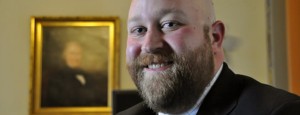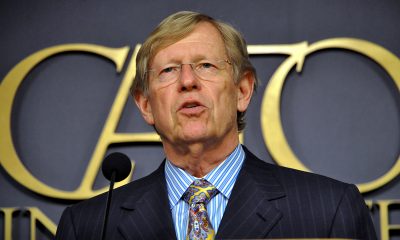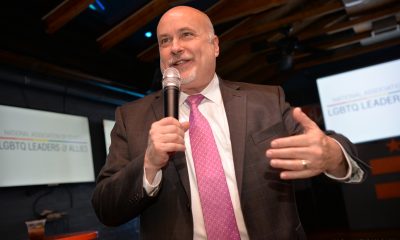National
First openly gay U.S. House reading clerk relishes role
Joe Novotny ‘tremendously proud’ to take prominent position

Joe Novotny, the first openly gay U.S. House reading clerk, reads bills, resolutions and messages from the president to Congress. (DC Agenda photo by Michael Key)
It’s part of making history.
That’s part of the reason Joe Novotny enjoys his role as reading clerk for the U.S. House.
Just last week, he had the distinction of reading to House members Rep. Charlie Rangel’s (D-N.Y.) message announcing his intent to resign as chair of the Ways & Means Committee. That message, issued by Novotny, went through the media to reach people across the country.
Other milestones in which Novotny may soon take part could include the passage of health care reform — or the repeal of “Don’t Ask, Don’t Tell.”
“You just feel the energy when you walk out on the House floor,” Novotny told DC Agenda. “If there’s a vote, or even just a heated debate, if something’s happening — the feeling that you get from that room is probably unlike anything everywhere else that you could really describe.”
And yet, Novotny is making history simply by holding the job. The 34-year-old Chicago native is the first openly gay person to work as a reading clerk in the U.S. House. Charged with reading messages to lawmakers and having his performance broadcast across the world on C-SPAN, Novotny is one of the most visible figures in House proceedings.
“I’m tremendously proud,” he said. “I feel like it’s an opportunity to represent the community. When you think about the diversity in this House now — and the fact that we have the first woman speaker and we have the first African-American clerk of the House — this is sort of a Congress of firsts, so to be a part of that is a tremendous honor.”
As reading clerk for the House, Novotny is charged with reading messages to House members and ensuring legislative measures before the chamber are clearly articulated to lawmakers and the public. He also tracks changes to bills made on the House floor.
“As House reading clerk, you’re responsible for reading all the bills and resolutions that come up throughout the day — and so there are all these other letters that come and messages from the president, and so you are responsible essentially for reading and representing these people,” Novotny said.
Other duties for Novotny include delivering House-approved measures to the Senate and working with official reporters to transcribe remarks in case a House member wants them stricken down.
Novotny is one of two reading clerks for the House. The other reading clerk, Susan Cole, was appointed by Republican leadership. Novotny and Cole are under the jurisdiction of Lorraine Miller, the House clerk and chamber’s official record keeper.
U.S. House Speaker Nancy Pelosi appointed Novotny to his role in December, and he’s served in the position for six weeks. No newcomer to Capitol Hill, Novotny was a congressional page when he was 16. For 15 years, he was a staffer for the House Education & Labor Committee, most recently as chief clerk for the panel.
Now as someone who sits on the podium with the speaker or speaker pro-tempe as lawmakers debate bills, Novotny is one of the more visible figures in the House.
In a statement, Pelosi highlighted the importance of Novotny’s job and his qualifications for taking on the position.
“As reading clerk, Joe will be the voice of the House of Representatives and will play an integral role in the daily operations of Congress,” she said. “Joe brings his experience and professionalism from the Education & Labor Committee, and we are grateful for his service.”
Novotny said his sexual orientation hasn’t made his job any more difficult or impaired relationships with his colleagues.
“I’ve been very, very lucky that throughout my career on the Hill, I’ve always been met with people who have looked at me pretty much just at face value, and it’s never been an issue,” he said. “I’ve always been open about who I am and it’s always been met with understanding and respect.”
But one challenge Novotny has encountered in his new role is needing to recognize all 435 House members immediately.
“Basically you have to learn every single person by name and by sight,” he said. “If somebody’s coming up and you’re at the podium, you’re responsible for announcing who that member is as they’re voting at the end of the vote or announce their changes.”
Since his years at George Washington University, where he studied political communications, Novotny said he’s had an affinity for politics.
“I’ve always been fascinated by politics,” he said. “I think that people lose sight of the fact that politics is not just about policy, it’s about relationships.”
Novotny said people “use politics every day in our lives” in relationships with colleagues, loved ones and friends.
“So, I guess I’m fascinated by relationships that people have and how everybody uses politics in form or another,” he said.
It’s that fascination with politics that lead him to take a position as staffer on the House Education & Labor Committee under the supervision of Chairman George Miller. Novotny said leaving his old job to become reading clerk was “bittersweet” because Miller is “such a great boss.”
“The thing about him is that he’s a little informal, and he likes to just be called by his first name,” Novotny said. “It’s never Mr. Chairman or congressman. He likes to be called George. So when you have that kind of relationship from the get go, you can really — you establish this great relationship.”
In 2007, Novotny was working for the committee when it sent the Employment Non-Discrimination Act to the House floor. Lawmakers in that chamber later approved the bill.
“That was really a very, very proud moment for me to be a part of that, and actually, seeing that pass the House floor in the last Congress was great,” he said.
In a statement, Miller congratulated Novotny for landing his new position, recalling the former committee staffer’s years of service on the panel.
“Joe was an incredibly valuable asset to my staff for nearly 15 years,” Novotny said. “His unparalleled integrity and dedication helped our committee advance major policies that are making a difference in the lives of working families. I know Joe will bring the same level of enthusiasm, expertise and steadfast commitment of service to his new role as House reading clerk.”
State Department
HIV/AIDS activists protest at State Department, demand full PEPFAR funding restoration
Black coffins placed in front of Harry S. Truman Building

Dozens of HIV/AIDS activists on Thursday gathered in front of the State Department and demanded the Trump-Vance administration fully restore President’s Emergency Plan for AIDS Relief funding.
Housing Works CEO Charles King, Health GAP Executive Director Asia Russell, Human Rights Campaign Senior Public Policy Advocate Matthew Rose, and others placed 206 black Styrofoam coffins in front of the State Department before the protest began.
King said more than an estimated 100,000 people with HIV/AIDS will die this year if PEPFAR funding is not fully restored.
“If we continue to not provide the PEPFAR funding to people living in low-income countries who are living with HIV or at risk, we are going to see millions and millions of deaths as well as millions of new infections,” added King.
Then-President George W. Bush in 2003 signed legislation that created PEPFAR.
The Trump-Vance administration in January froze nearly all U.S. foreign aid spending for at least 90 days. Secretary of State Marco Rubio later issued a waiver that allows the President’s Emergency Plan for AIDS relief and other “life-saving humanitarian assistance” programs to continue to operate during the freeze.
The Washington Blade has previously reported PEPFAR-funded programs in Kenya and other African countries have been forced to suspend services and even shut down because of a lack of U.S. funding. Two South African organizations — OUT LGBT Well-being and Access Chapter 2 — that received PEPFAR funding through the U.S. Agency for International Development and the Centers for Disease Control and Prevention in recent weeks closed down HIV-prevention programs and other services to men who have sex with men.
Rubio last month said 83 percent of USAID contracts have been cancelled. He noted the State Department will administer those that remain in place “more effectively.”
“PEPFAR represents the best of us, the dignity of our country, of our people, of our shared humanity,” said Rose.
Russell described Rubio as “ignorant and incompetent” and said “he should be fired.”
“What secretary of state in 90 days could dismantle what the brilliance of AIDS activism created side-by-side with George W. Bush? What kind of fool could do that? I’ll tell you who, the boss who sits in the Harry S. Truman Building, Marco Rubio,” said Russell.

U.S. Military/Pentagon
Pentagon urged to reverse Naval Academy book ban
Hundreds of titles discussing race, gender, and sexuality pulled from library shelves

Lambda Legal and the Legal Defense Fund issued a letter on Tuesday urging U.S. Defense Secretary Pete Hegseth to reverse course on a policy that led to the removal of 381 books from the Nimitz Library of the U.S. Naval Academy in Annapolis, Md.
Pursuant to President Donald Trump’s executive order 14190, “Ending Radical Indoctrination in K-12 Schooling,” the institution screened 900 titles to identify works promoting “diversity, equity, and inclusion,” removing those that concerned or touched upon “topics pertaining to the experiences of people of color, especially Black people, and/or LGBTQ people,” according to a press release from the civil rights organizations.
These included “I Know Why the Caged Bird Sings” by Maya Angelou, “Stone Fruit” by Lee Lai, “The Hate U Give” by Angie Thomas, “Lies My Teacher Told Me: Everything Your American History Textbook Got Wrong” by James W. Loewen, “Gender Queer: A Memoir” by Maia Kobabe, and “Democracy in Black: How Race Still Enslaves the American Soul” by Eddie S. Glaude, Jr.
The groups further noted that “the collection retained other books with messages and themes that privilege certain races and religions over others, including ‘The Clansman: A Historical Romance of the Ku Klux Klan’ by Thomas Dixon, Jr., ‘Mein Kampf’ by Adolf Hitler, and ‘Heart of Darkness’ by Joseph Conrad.
In their letter, Lambda Legal and LDF argued the books must be returned to circulation to preserve the “constitutional rights” of cadets at the institution, warning of the “danger” that comes with “censoring materials based on viewpoints disfavored by the current administration.”
“Such censorship is especially dangerous in an educational setting, where critical inquiry, intellectual diversity, and exposure to a wide array of perspectives are necessary to educate future citizen-leaders,” Lambda Legal Chief Legal Officer Jennifer C. Pizer and LDF Director of Strategic Initiatives Jin Hee Lee said in the press release.
Federal Government
White House sues Maine for refusing to comply with trans athlete ban
Lawsuit follows months-long conflict over school sports in state

The Justice Department is suing the state of Maine for refusing to comply with President Donald Trump’s executive order banning transgender athletes from participating in school sports, U.S. Attorney General Pam Bondi announced on Wednesday.
DOJ’s lawsuit accuses the state of violating Title IX rules barring sex discrimination, arguing that girls and women are disadvantaged in sports and deprived of opportunities like scholarships when they must compete against natal males, an interpretation of the statute that reverses course from how the law was enforced under the Biden-Harris administration.
“We tried to get Maine to comply” before filing the complaint, Bondi said during a news conference. She added the department is asking the court to “have the titles return to the young women who rightfully won these sports” and may also retroactively pull federal funding to the state for refusing to comply with the ban in the past.
Earlier this year, the attorney general sent letters to Maine, California, and Minnesota warning the blue states that the department “does not tolerate state officials who ignore federal law.”
According to the Maine Principals’ Association, only two trans high school-aged girls are competing statewide this year. Conclusions from research on the athletic performance of trans athletes vis-a-vis their cisgender counterparts have been mixed.
Trump critics and LGBTQ advocates maintain that efforts to enforce the ban can facilitate invasive gender policing to settle questions about an individual athlete’s birth sex, which puts all girls and women at risk. Others believe determinations about eligibility should be made not by the federal government but by school districts, states, and athletics associations.
Bondi’s announcement marked the latest escalation of a months-long feud between Trump and Maine, which began in February when the state’s Democratic governor, Janet Mills, declined to say she would enforce the ban.
Also on Wednesday, U.S. Education Secretary Linda McMahon said the findings from her department’s Title IX investigation into Maine schools — which, likewise, concerned their inclusion of trans student-athletes in competitive sports — was referred to DOJ.
Earlier this month, the Justice Department pulled $1.5 million in grants for Maine’s Department of Corrections because a trans woman was placed in a women’s correctional facility in violation of a different anti-trans executive order, while the U.S. Department of Agriculture paused the disbursement of funds supporting education programs in the state over its failure to comply with Title IX rules.
A federal court last week ordered USDA to unfreeze the money in a ruling that prohibits the agency from “terminating, freezing, or otherwise interfering with the state’s access to federal funds based on alleged Title IX violations without following the process required by federal statute.”
-

 District of Columbia3 days ago
District of Columbia3 days agoFinal push to raise funds, fill D.C. hotels as WorldPride nears
-

 District of Columbia3 days ago
District of Columbia3 days agoReenactment of 1965 gay rights protest at White House set for April 17
-

 Maryland3 days ago
Maryland3 days agoFreeState Justice: Transgender activist ‘hijacked’ Moore’s Transgender Day of Visibility event
-

 Hungary3 days ago
Hungary3 days agoHungarian MPs amend constitution to ban public LGBTQ events












